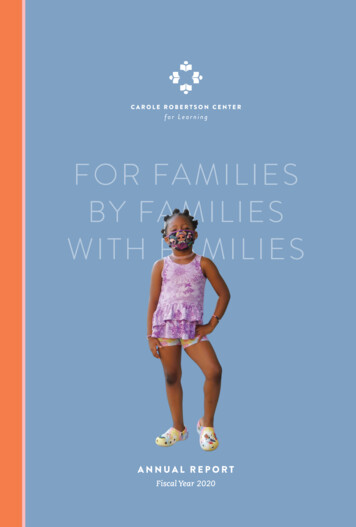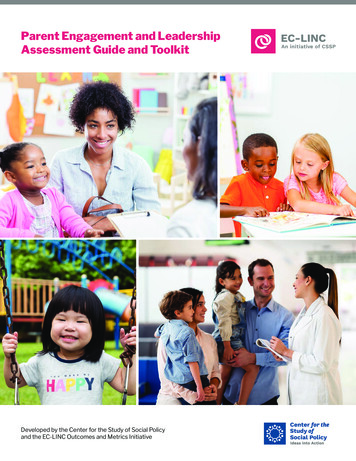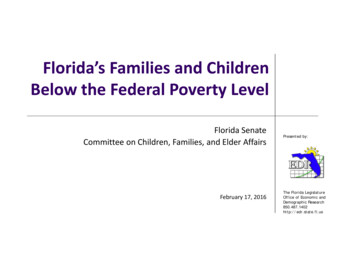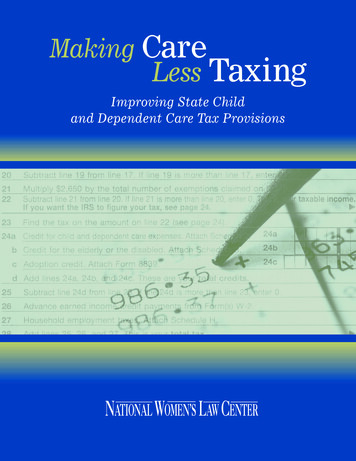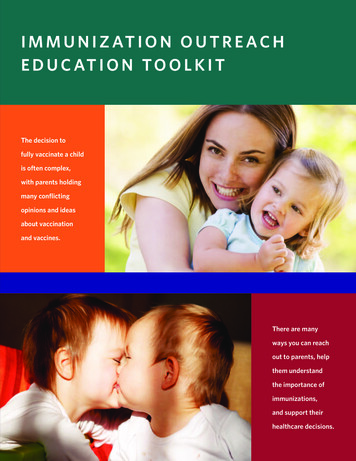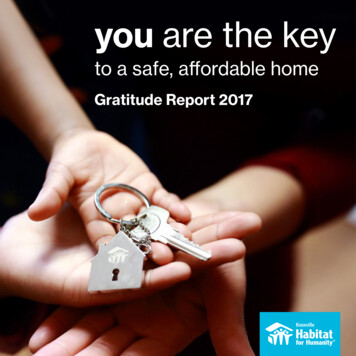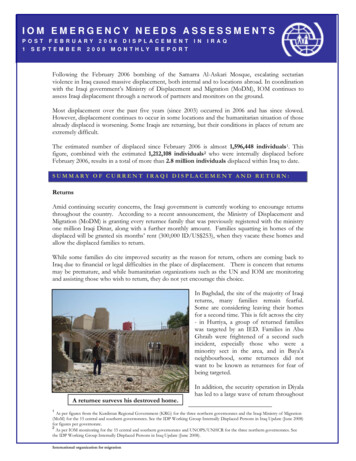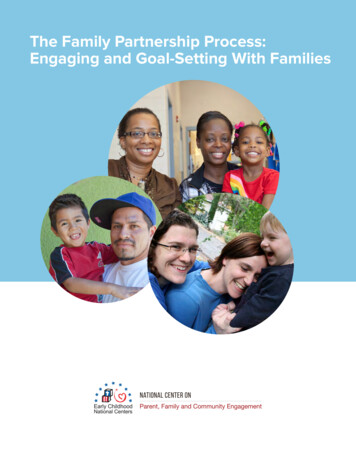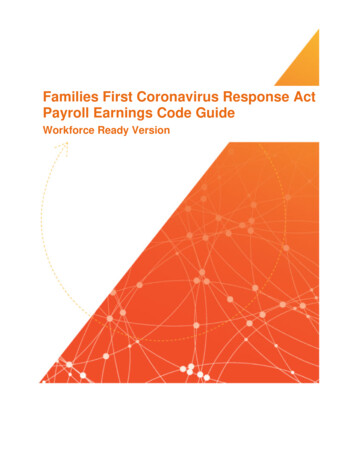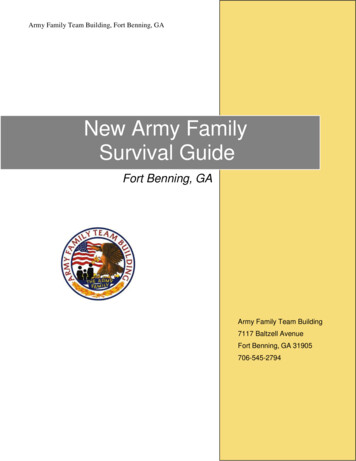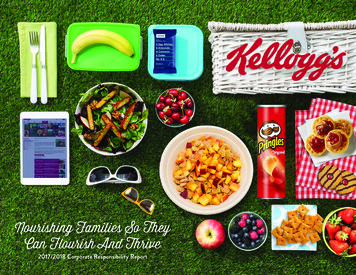
Transcription
Nourishing Families So TheyCan Flourish And Thrive2017/2018 Corporate Responsibility Report
2017 KELLOGG COMPANY CORPORATERESPONSIBILITY HIGHLIGHTSNourishing WITH OUR FOODS Cereal eaters tend to consumeless fat, less cholesterol and morefiber than non-cereal eaters. iWe are continuing to incorporatepositive nutrients and ingredientsin our foods including:Vitamins A, B and Dironcalciumfolic acidantioxidants83%of our foods are vegetarian.These plant-based foodsuse less natural energy toproduce. ii OUR PLANET PEOPLE IN NEED Created more than300,000 Nearly Achieved more than7,400 volunteer days Engaged 66 million people OUR FOUNDER’S VALUES for nearlyfarmers including:through our586,000 childrenLivingSupported improved livelihoods637 million Better Days Reached more thanNourishing families so theycan flourish and thriveNurturingFeeding Donated nearly 570 millionservings of foodOur Purpose: 20,000 smallholder20 yearsfarmersin our direct supply chain.Celebratingof supplier diversityResponsibly sourcing 10priority ingredients.More than40 PROJECTSaround the worldare increasing yields,climate resiliency andfarmer livelihoods.WORLD FOOD DAY: 22 countriesSupported 38 food banks 1,388 volunteer hoursADDRESSING GENDER EQUALITY AND WOMEN’S EMPOWERMENT ACROSS OUR CORPORATE RESPONSIBILITY PILLARSHelped 1,000 women in India plantorganic kitchen gardens toincrease nutrition andeconomic empowerment.Provided nutrition education to500,000U.N. Foundation Girl Up participants.Helped more than10,000women farmers and workersimprove their livelihoods usingclimate-smart agriculture practices.Our global Women of KelloggBusiness/Employee Resource Groupled a company-wide celebration ofInternational Women’s Dayon six continents.2017/2018 Corporate Responsibility Report 2iCho S, et al. The effect of breakfast type on total dietary energy intake and body mass index. Results from the Third National Healthand Nutrition examination Survey (NHANES). J Am Coll Nutr. 2003; 22:296-302.iiThe American Journal of Clinical Nutrition, Volume 78, Issue 3, 1 September 2003, Pages 660S–663S, https://doi.org/10.1093/ajcn/78.3.660S
OVERVIEWContents4568Message from the CEOAbout Kellogg CompanyAbout this reportOur commitmentsNOURISHING WITH OUR FOODS1212151517Inspired by our food beliefsSupporting health and well-beingIncreasing transparencyEnsuring food quality and safetyMarketing responsiblyFEEDING PEOPLE IN NEED20212628Breakfasts for Better DaysTMAddressing food securityReducing food loss and wasteCharitable donationsNURTURING OUR PLANETCORPORATERESPONSIBILITYREPORT 2017/2018Sourcing responsiblyImproving sustainable agricultureSupporting smallholder farmers, including womenConserving natural resources and protecting against climate changePackaging3131333437LIVING OUR FOUNDER’S VALUESOperating ethicallyProtecting human rightsEmbracing diversity and inclusion4041422017/2018 Corporate Responsibility Report 3
MessageFROM THE CEOWelcome to Kellogg Company’s 10th GlobalCorporate Responsibility Report. Annually, we’vehighlighted the work we’re doing around the worldto fulfill our company’s purpose of nourishingfamilies so they can flourish and thrive. We’re proudof our accomplishments during the past decade,and we’re even more proud of our company’s112-year legacy of making a difference.Kellogg is a leading global food company,seeking to drive transformational change inaddressing the worldwide issue of food securitythrough our integrated commitments tonutrition, hunger relief and sustainability.It all started in 1906, when W.K.Kellogg foundedour company to provide a healthier breakfast option.Mr. Kellogg set out to change the way people atebreakfast and he ended up changing the world.He wasn’t only a brilliant business person, he was oneof the world’s early conservationists and a leadingphilanthropist. He instilled in our company the valuesthat continue to inspire us today.So, from our earliest days, Kellogg has been a purposedriven organization, a company with a heart and soul.This approach continues to set us apart. Across ourvalue chain – from farm to family table – we’re focusedon doing our part to achieve five United Nations(U.N.) 2030 Sustainable Development Goals (SDGs): #2 – Zero Hunger #5 – Gender Equality #12.3 – Food Loss and Waste #13 – Climate Action #17 – PartnershipsWe’re also protecting human rights, including forcedand child labor, preserving the environment andenforcing anti-corruption as a member of the U.NGlobal Compact. We’re doing so through the followingfour pillars of our Heart and Soul strategy, includingour Breakfasts for Better Days global signature causeplatform:Our abilities to make a difference in people’s lives andto win in the marketplace are completely intertwined.In today’s world, with connected, socially consciousconsumers, we simply cannot do one without theother. That’s why our Heart and Soul strategy is anessential part of our company’s Deploy for Growthstrategy and a key contributor to business success.We also know that no one can achieve the ambitiousand essential U.N. SDGs alone, which is why thededication of our passionate team of colleagues andour many partnerships are so important.Thank you for your interest in our CorporateResponsibility Report. We look forward to yourfeedback and to providing regular updates as wecontinue nourishing families so they can flourish andthrive.Steve CahillaneChairman and Chief Executive OfficerMay 20182017/2018 Corporate Responsibility Report 4
About KELLOGG COMPANY2017 SALES: 33,000US 13 BILLIONEMPLOYEES2ND LARGEST1,600 FOODSPRODUCER OF CRACKERSAND SAVORY SNACKSPRODUCED IN21 COUNTRIESWORLD’S LEADINGMARKETED IN180 COUNTRIESCEREALCOMPANYNORTH AMERICANFROZENFOODSCOMPANYCOMMITTED TO CREATING3 BILLIONBETTER DAYS BY THE ENDOF 2025 THROUGH OURBREAKFASTS FOR BETTERDAYS GLOBAL SIGNATURECAUSE PLATFORM“Use the money as you please, as long as itpromotes the health, happiness and well-beingof children.”– W.K. Kellogg on his vision for theW.K. Kellogg FoundationThe W.K. Kellogg Foundation (WKKF),established in 1930 as an independent, privatefoundation, is among the largest philanthropicfoundations in the U.S. As legally separateentities, Kellogg Company has no influenceon the Foundation’s activities, programsor initiatives. WKKF receives its incomeprimarily from the W.K.Kellogg FoundationTrust, and the Trust is Kellogg Company’slargest shareowner. In 2017, Kellogg stockwas approximately 57 percent of the Trust’sportfolio, and Kellogg Company paid morethan US 142 million in dividends to the Trustto fund the Foundation’s work to supportthriving children, working families andequitable communities.2017/2018 Corporate Responsibility Report 5
About THIS REPORTThis report has been prepared using the Global Reporting Initiative (GRI) Standards and Food Processing Sector Standards introduced in October 2016. It has also beeninformed by the Provisional Standards of the Sustainability Account Standards Board (SASB), which have also been addressed in our Proxy Statement. We arereporting in accordance with the GRI “Core” option. We also included additional information that addresses some “Comprehensive” reporting disclosures. While theReport primarily covers calendar year 2017, it also includes developments from early 2018. Our most recent, full GRI-based Report was published in 2017. We intend tocontinue providing an annual Report and Index. We welcome your feedback and questions at corporateresponsibility@kellogg.com.MATERIALITY A team of senior leaders at Kellogg, with input from internal and external stakeholders, used a materiality assessment process to understandour current and potential social, ethical, environmental and economic impacts. This information shapes our corporate responsibility strategyand informs our financial reporting and disclosures. To determine materiality, we focused on those topics that:Align with the company’s vision, purpose, strategy, brand portfolio and geographic footprint;Intersect multiple areas of the company’s value chain that we can impact; and,Affect consumers, customers, colleagues, communities, regulatory agencies or other stakeholders in regions where we operate and source.These material topics serve as the foundation of the four sections of our Corporate Responsibility Report.IMPORTANCE TO STAKEHOLDERSFood quality and safetyHealth and well-beingNatural resourceconservationFood securitySustainable agricultureClimate changeTransparencyResponsible marketingHuman rightsFood loss and wasteDiversity and inclusionBusiness ethics and complianceNourishing With Our FoodsFeeding People In NeedNurturing Our PlanetIMPACT TO KELLOGG COMPANY’S VALUE CHAINLiving Our Values2017/2018 Corporate Responsibility Report 6
About THIS REPORTOUR VALUE CHAIN CONTINUEDWe have also evaluated the boundaries of these material topics, identifying where the impacts of each occur in our value chain.Research &DevelopmentCreatinggreat-tasting,high-quality foodsthat nourish anddelight familiesAgricultureWorking withfarmers whoplant, care forand harvestcropsSuppliersPurchasingingredientsfor foods andmaterials forpackagingManufacturingMarketing& Packaging& SalesPreparing andCreatingpackagingexcitement forfoodsand purchase ofour foodsDistributionStoring anddeliveringfoodsCustomersWorking withretailers andothers to makeour foodsavailableConsumersEnjoying ourfoodsEnd of LifeRecyclingor properlydisposingof thepackagingfrom ourfoodsFood quality and safetyNourishingWith OurFoodsHealth and well-beingResponsiblemarketingHealth and well-beingResponsible marketingTransparencyFeedingPeople InNeedFood loss and wasteFood securityClimate changeNurturingOur PlanetFood loss and wasteFood loss and wasteSustainableagricultureSustainable agricultureLiving OurValuesNaturalresourceconservationNatural resource conservationSustainable agricultureBusiness ethics and complianceDiversity and inclusionHuman rightsOur GRI index provides additional information on economic, environmental and social topics, as well as topics specific to the food processing sector.2017/2018 Corporate Responsibility Report 7
Our COMMITMENTSThe following dashboard summarizes our progress against the commitments we’ve made to nourish with our foods, feed people in need and nurture our planet. Additionalinformation on our progress against each of these commitments is outlined in the respective sections of this report and the GRI Index, as well as on our corporate website.SectionNourishingWith OurFoodsPriorityInspired by ourFood BeliefsFocus AreaCommitmentSnacksiBy 2020, include one or more positive nutrients or ingredients in every snack food in theconvenient nutrition (bars and other snacks) category.By 2020, reduce sugar on average by 10% per serving, excluding fruit, in our convenientnutrition bars and other snacks, from a 2011 baseline.By 2020, at least 85% of convenient nutrition bars and other snacks will have 150 or fewer mgof sodium per serving.Breakfasts forBetter DaysTM –Hunger Relief iiFeedingPeople InNeedAddressing FoodSecurityFood Loss andWaste4 OPERATINGREGIONS:1.2.3.4.i75%CompleteCompleteBy the end of 2025, donate 2.5 billion servings of food to people in need.569,950,393 servingsBy the end of 2025, expand feeding and nutrition education programs so 2 million children canreach their full potential.586,772 children reachedBy the end of 2025, commit to 45,000 volunteer days by Kellogg employees and retirees.7,451 volunteer daysBy the end of 2025, engage 300 million people around the issue of hunger relief.By the end of 2025, create three billion Better Days by donating food, feeding people,supporting farmers and volunteering, and engaging people.66,694,553 peopleBy 2030, do our part to halve per capita global food waste at the retail and consumer level, andto reduce food losses along the production and supply chains including post-harvestii (alignedwith U.N. SDG #12.3, as part of Champions 12.3).637,538,534 Better Days4.7% absolute reductionwithin Kelloggmanufacturing operations2.9% normalized reductioncwithin Kelloggmanufacturing operations20.4 metric tonnes of foodwaste/net salesKAP (ASIA PACIFIC, SUB-SAHARAN AFRICA)KEU (EUROPE, MIDDLE EAST, NORTH AFRICA & RUSSIA)KLA (LATIN AMERICA)KNA (U.S. AND CANADA)Data are an average of our six core markets, which represent the majority of our worldwide sales.From a 2016 baselineii2017 Progress2017/2018 Corporate Responsibility Report 8
Our COMMITMENTSSectionPriorityFocus AreaCONTINUEDCommitment2017 ProgressBy 2020, reduce energy use by an additional 15%.By 2020, reduce GHG emissions by an additional 15%.iii, ivBy 2020, expand the use of low-carbon energy in our plants by 50%.ivClimate and Energy By 2050, reduce Scope 1 & 2 emissions in our operations by 65%.ivBy 2050, partner with our direct suppliers to help reduce their Scope 3 emissions by50 percent (including agriculture).ivBy 2050, source 100% renewable electricity.By 2020, implement water reuse projects in at least 25% of our plants.By 2020, reduce our water use by an additional 15%.iii, ivWaterContinue watershed quality support.2.1%11.4%Complete13.6%WasteBy 2020, reduce total waste in our plants by 15%, with a focus on food waste.iii, iv2.5%Continue commitment to ensure that 100% of all timber-based packing is either recycled orcertified as sustainably sourced.CompleteContinue adding value to foods and the planet by increasing our use of resource-efficientpackaging.In 2017, 71% of packagingmaterial was from recycledcontent; the remainder wasfrom verified sustainablesources.IngredientsBy 2020, responsibly source our 10 priority ingredients: corn, wheat, rice, potatoes, sugarbeet, sugar cane, fruits, palm oil, vanilla and cocoa. More than 70 priority-ingredient suppliersare engaged in measuring continuous improvement or investment in improved livelihoods insourcing communities.Learn more about ourmethodology andprogress here.Breakfasts forBetter DaysTM –SustainableAgricultureBy 2020, improve sustainable agriculture by enabling 500,000 farmers to use climate-smartagriculture practices and reducing post-harvest loss.299,365 farmersSmallholderFarmersBy 2020, support 15,000 smallholder farmers in our direct supply chain to increase adoption of Commitment is complete.climate-smart agriculture practices and help improve their livelihoods and climate resiliency.Work is ongoing.Women Farmers/WorkersBy 2020, develop programs to help women farmers/workers improve their livelihoods, familiesand communities using climate-smart agriculture practices.iii, ivConservingNaturalResourcesNurturingOur PlanetPackagingSourcingResponsiblyPer metric tonne of food producedFrom a 2015 baselineEstablished baseline in 201719%16.4%1.8%OngoingSupported more than10,000 women farmers.iiiiv2017/2018 Corporate Responsibility Report 9
Nourishing WITH OUR FOODS Every day, millions of people in more than 180 countries invite us into their homes and to their tables. They trust Kellogg and our brands toprovide their families with great-tasting, high-quality foods. A key part of this trust is our company’s reputation for developing innovative,delicious and nutritious foods.Our founder, W.K. Kellogg, revolutionized the food industry by creating a better-for-you breakfast category. His grain-based, ready-to-eatcereals provided families with accessible, affordable nutrition. Today, our portfolio has expanded considerably to include snacks and frozenfoods. These priorities, along with our company’s purpose of nourishing families so they can flourish and thrive, continue to energize our team tomeet the high expectations people have for our foods and company.2017/2018 Corporate Responsibility Report 10
2017 Nourishing WITH OUR FOODSTHE POWER OFGrains require lessnatural resourcesto produce.iHealth &Well-beingGrains83% of our foodsare vegetarian.SUPPORTINGInvesting in newplant-based foodsand proteins.ADDRESSING NUTRITION SHORTFALLSTO HELP CLOSE NUTRIENT DEFICIENCY GAPS: Added Vitamin D to cereals in Australia, Europe and the U.S.Increasing TransparencyASK QUESTIONS AND RECEIVEANSWERS ONLINE Improved Latin American cereals with the right amounts ofVitamins A, B and D, iron, calcium, folic acid and antioxidantsENSURING FOOD BY 2020, OUR CONVENIENTNUTRITION BARS ANDSNACKS WILL HAVEAN AVERAGE: ii1OR MOPOSITI RENUTRI VE iiiENTS10%SUGARiiiREDUCTION150MGOR LESSiiiSODIUMour foods are produced in facilities meetingthird-party quality standards.100% ofstringent1,425 audits conducted to monitor food safety. US 60 million invested in food safety systems and processes.SNACKSSnack Food BeliefsQuality & Safety BETTER BREAKFASTSSTART WITH CEREAL:Cereal eaters tend to consume less fat,less cholesterol and more fiber thannon-cereal eaters. ivBreakfast Food BeliefsACHIEVED 2020 SUGAR/SODIUMREDUCTION TARGETS AHEAD OF SCHEDULEThe American Journal of Clinical Nutrition, Volume 78, Issue 3, 1 September 2003, Pages 660S–663S, https://doi.org/10.1093/ajcn/78.3.660SData are an average of our six core markets, which represent the majority of our worldwide sales.iiiPer servingivCho S, et al. The effect of breakfast type on total dietary energy intake and body mass index. Results from the Third2017/2018National Health and Nutrition examination Survey (NHANES). J Am Coll Nutr. 2003; 22:296-302.iiiCorporate Responsibility Report 11
InspiredBY OUR FOOD BELIEFSWe understand the significant contribution breakfastcereals make to the diets of children and adultsworldwide and embrace our responsibility to continueevolving these foods to meet people’s expectationsfor taste, transparency and nutrition. Doing so alsohelps address the dual global food security challengesof undernutrition and obesity identified in SDG #2– Zero Hunger. To guide our journey, we launchedour Global Breakfast Food Beliefs in 2015, settingspecific sugar and sodium reduction targets for 2020.In 2016, we achieved these goals and strive to makemore progress with innovation and renovation in thefuture.Better breakfasts start with cerealCereal eaters tend to consume less fat,less cholesterol and more fiber thannon-cereal eaters.aFor those time-crunched mornings, cereal isa simple, quick and nutritious breakfast. Insidethe bowl, you can easily enjoy three food groups- grains, dairy and fruit. Or, swap yogurt for themilk and make a quick smoothie or yogurt parfait.A INGRSDAIRYFRUITFor example, KEU announced that it is furtherreducing the sugar in Kellogg’s Coco Pops , Kellogg’s Rice Krispies and Kellogg’s Rice Krispies Multi-GrainShapes, and further reducing sodium in Kellogg’s Rice Krispies . This change was well received by many,including the U.K. Minister of State for Public HealthSteve Brine, who commended Kellogg for the actionswe have taken on reformulation. New food will beginflowing through to KEU store shelves in July 2018.REDUCINGSODIUM & SUGARREDUCING SODIUM& SUGAR, ADDINGPOSITIVE NUTRIENTSGiven the growth of snacking and snacks as mealreplacements, we announced Global Snack FoodsBeliefs in 2016. Designed to give people more ofwhat they want and less of what they don’t, we set2020 as our target for these changes. Already, we’vemet our sodium reduction goals, and are continuingto incorporate positive nutrients and ingredients andfurther reduce sugar.In Europe, we reduced sugar and sodium in ourKellogg’s Coco Pops , Rice Krispies and Frosties Cereal Milk Bars. Kellogg also continues to removeartificial colors and flavors from our foods. In responseto consumer feedback, we’ve already done so acrossthe Eggo waffles portfolio; several cereals and snacksin the U.S., including Kellogg’s Coco Krispies andKellogg’s Special K bars; and Kellogg’s Froot Loops and Kellogg’s Corn Pops in Canada. More foodswithout artificial colors and flavors will continue to beintroduced going forward.REDUCING ARTIFICIALCOLORS & FLAVORSSupportingHEALTH AND WELL-BEINGAs a company founded on offering a more nutritiousbreakfast choice, Kellogg has long been a leader insupporting health and well-being. Today, we havea comprehensive health and wellness strategy thatguides our nutrition innovations. This strategy ishighlighted in our Nutrition Milestones reportand aligned with the priorities in the World HealthOrganization’s Global Action Plan for the Preventionand Control of Non-Communicable Diseases.Additionally, we’re focused on closing the gap onhidden hunger and micro/macro nutrient deficienciesin emerging and developed markets. These twoseparate, but interrelated, aspects of public healthare reflected in our food development and nutritioneducation work.2017/2018 Corporate Responsibility Report 12
INTRODUCING NEW FOODSUnderstanding that people want foods with ingredients that are both nutritious and responsibly sourced,KEU introduced a new line of W.K. Kellogg cereals and granolas that are organic, vegan and have no addedsugar. Named in honor of our founder, when someone buys W.K. Kellogg cereals and granolas, we donate toorganizations that provide breakfast for people in need and we support sustainable agriculture across Europeand the Middle East.In all our regions, our Special K brand, in particular, is introducing new foods with better-for-you ingredients.These include: Special K cereal fortified with Vitamin D in Australia; Special K Nourish cereal with quinoa bars and Special K Nourish cereal with popped granola and quinoa inCanada; Special K Nourish cereal with hazelnuts, almonds & pumpkin seeds in Europe and the Middle East. Special K Protein & Fibre cereal in India; Special K Nutrifit cereal in Korea; and, Special K cereal with probiotics,Special K Crunchy Bites withsunflower seeds and dark chocolate,and Special K Trail Mix protein in the U.S.Investing in the power of grainsOur early ancestors first farmed grains –rice, corn and wheat – nearly 13,000 yearsago. Today, grains are still the most importantingredient at Kellogg, which is why we lookfor the very best – responsibly sourced andsustainably grown – for our foods.Across our portfolio, we’re looking at grains fortheir unique benefits, including the fact thatthey use less natural resource to produce thanother foods.b This is increasingly importantwhen we consider how we can help addressfood security. Already, 83 percent of our foodsare vegetarian.cWe continue to invest in this space throughour Eighteen94 Capital fund that is pursuingnext-generation start-up businesses, includingseveral plant-based nutrition and proteincompanies.We’ve also continued improving the nutrition profile of several of our foods to help address shortfall nutrients,or nutrients of need. This includes adding Vitamin D to cereals for the U.S. and KEU markets and improvingthe fortification of our KLA cereals with the right amounts of Vitamins A, B and D; iron, calcium, folic acid andantioxidants essential for children’s growth and development and adults’ well-being.Our foods are certainly an important source of nutrition; they should also simply taste good. In Asia, weintroduced three culturally-relevant foods that do just this. Feedback has been extremely positive on our newKellogg’s Rose Granola in China; Kellogg’s Brown Rice Granola in Japan; and Kellogg’s Real Granola TripleBean with peas, soy and black beans in Korea.We also continued introducing new foods in emerging markets, launching three new snack bars in South Africa,Kellogg’s Coco Pops , Rice Krispies and Crunchy Nut .2017/2018 Corporate Responsibility Report 13
PROVIDING NUTRITIONEDUCATION We have continued progressing our initiatives toprovide nutrition education and active lifestylecommunications to support our commitment toBreakfasts for Better Days . In 2017, we launchedpartnerships with nutrition and medical professionals,as well as retailers. Kellogg U.S. hosted nutrition summits with leadingexperts on gut health and the importance ofprotein for women that informed new productofferings from our Special K brand. Kellogg U.K. and our Kellogg’s All-Bran brandhave a strategic partnership with the U.K. RoyalCollege of Midwives to share the results ofscientific research pointing to the benefits ofwomen wheat bran fiber to during pregnancy andwhile breast feeding.d Leaders from Instituto de Nutrición y SaludKellogg’s, the Kellogg nutrition and healthinstitute that operates in Mexico and Colombia,participated in congresses in Mexico, Argentinaand Colombia attended by pediatricians, nutritionprofessionals and nutrition students to share thelatest research on food intake and metabolichealth. We also served on the Symposium onFood and Nutrition: Gender Perspective panelat the XVII Colombian Congress of Nutritionand Dietetics, providing information about thenutrition benefits and origins of our grains, as wellas our work helping local farmers increase theirsustainable agriculture practices.To help share information on the nutrition valueof cereal and milk as either a breakfast or snackin children’s diets, we partnered with ShopRite’sin-store team of dieticians to provide informationand free samples for physicians and their patients,as well as in-store shoppers.Cultivating nutrition to fight hungerand improve gender equalityIn the rural areas of India’s state of MadhyaPradesh, maternal and child undernutritionlevels remain persistently and unacceptablyhigh. Kellogg Company’s organic kitchengarden project with TechnoServe is helpingfamilies improve their nutrition intakes byhelping women cultivate small vegetablegardens. As a result, 75 percent of householdsare now eating vegetables twice a day, and 22percent three times a day. The program hasimproved nutrition deficiencies in protein,calcium, Vitamin A and iron, and increasedenergy intake, which was below recommendedlevels. Women are also selling the surplus fromtheir gardens, which helps to improve theirlivelihoods.Bringing back our communitygardensKellogg employee gardens started in the U.S.during the Great Depression and continuedthrough the 1940s. A group of colleagues in theU.S. reintroduced employee gardens in 2017with great success. Teams at 10 office locationsharvested vegetables that were used in foodssold in our employee cafes. Plus, an extra 100pounds of fresh vegetables were donated tolocal food banks.Kirsten, on our Sustainability team, receiveda W.K. Kellogg Values Award in recognition ofhow this work reinforced our company’s value ofbeing passionate about our business, our brandsand our foods.2017/2018 Corporate Responsibility Report 14
IncreasingTRANSPARENCYToday, people expect transparency about their food.How is it made? Where is it coming from? Who makesit? And we enjoy this conversation. That’s why wehave Open for Breakfast, our digital platform in theU.S., Latin America, and Australia/New Zealand wherepeople can ask questions they have about our foodsand we answer. People can also contact the Consumer Affairs teams that support each of our regions andreach out via Twitter and Facebook.84EnsuringFOOD QUALITY AND SAFETY402017 Food Safetyand Quality AuditsSuppliersContract ManufacturersKellogg Facilites1,301The quality and safety of our foods, along with thesafety of our colleagues, are part of our core values.(See Living Our Founder’s Values for people safetyinformation.) Our Kellogg Food Safety System directsour global, comprehensive approach to uniform foodsafety standards. In addition, the Global Food SafetyInitiative (GFSI) certifies all our company-owned andcontract-manufacturing facilities, as well as ingredientsuppliers. Our North American facilities are also SQF(Safe Quality Food) certified.To ensure compliance against these high standards,GFSI conducts audits of our suppliers and co-manufacturers. Our internal team conducts audits of ourKellogg-owned manufacturing facilities, also againstGFSI standards.We continuously improve our efforts and investednearly US 60 million in new equipment and facilityimprovements in 2017. These investments supportedfurther advancements in our food safety systems andprocesses.What’s your question?VISIT US 2017/2018 Corporate Responsibility Report 15
Meet our Food Safety Advisory BoardGetting an external point of view, especially around something as critically important as food safety, makes good sense. This is the purpose of our ExternalFood Safety Advisory Board. This group of four distinguished experts augment the work of our internal team, advising us on all matters of food safety.David Acheson, M.D.,Founder and CEO,The Acheson GroupDr. Acheson has more than30 years of medical and foodsafety experience. He is theformer Chief Medical Officerfor the U.S. Food and DrugAdministration. Prior to that,he served in the same role atthe U.S. Food and DrugAdministration’s Center forFood Safety.James Atkinson, CEO,Atkinson ConsultingMr. Atkinson retired as VicePresident of Operations forKraft Foods. He understandsevery aspect of food safety, beginning his career asan hourly employee at thecompany and working in a widevariety of roles of increasingresponsibility for 34 years.Larry Keener, Presidentand General Manager,International Product SafetyConsultants (IPSC), Inc.Martin A. Philbert, Ph.D.,Provost and Executive VicePresident for Academic Affairs,University of MichiganMr. Keener has workedextensively on the developmentand implementation of foodsafety, quality, sanitation andregulatory compliance programsfor food companies around theworld. At IPSC, he focuses onfood safety and technologysolutions.Dr. Philbert is also a professorof toxicology in U of M’s Schoolof Public Health. His expertiseis in developing leading-edgenanoplatforms to sense ions andsmall molecules. He consults withfederal agencies on emergingnanotechnologies, nanomedicine,and health and safety.2017/2018 Corporate Responsibility Report 16
MarketingRESPONSIBLYKellogg adheres to high standards to responsiblymarket our foods, always meeting, and in oftencases, exceeding local requirements. Our globalcommitments are outlined in our WorldwideMarketing and Commun
entities, Kellogg Company has no influence on the Foundation’s activities, programs or initiatives. WKKF receives its income primarily from the W.K.Kellogg Foundation Trust, and the Trust is Kellogg Company’s largest shareowner. In 2017, Kellogg stock was approximately 57 percent of the Trust’s
